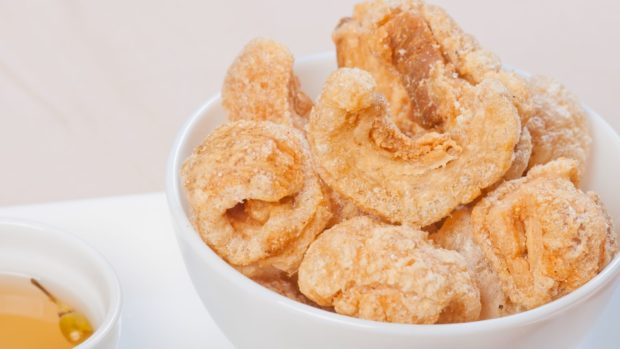Bulacan ‘chicharon’ sales up despite pandemic
SANTA MARIA, Bulacan, Philippines — When “chicharon” (fried pork rinds) makers in this town took a hit due to lockdowns at the height of the COVID-19 pandemic, quick-thinking local government officials decided to get creative.
By buying the deep-fried, crunchy cracklings in bulk and adding them to relief packs distributed to affected villagers, they managed to make the ailing industry pop again.
At the same time, the rising demand for a more affordable alternative to pork also helped boost sales.
Amelita dela Cruz, the owner of a chicharon store here, recalled that in March 2020, just weeks after the start of the COVID-19 pandemic, the quarantine restrictions imposed in many parts of the country disrupted their business.
“We even tried to sell [our products] at a bargain price and offered a buy-one take-one promo but there were still no takers at that time. It was heartbreaking,” the 60-year-old Dela Cruz told the Inquirer last week during the town’s celebration of the feast of its patron saint, La Purisima Concepcion.
Article continues after this advertisementEvery feast day on Feb. 3, sales would be brisk for her and other chicharon makers whose shops were located near the town’s parish as residents and visitors flocked to the area.
Article continues after this advertisementAnother chicharon trader, Edilberto Antonio, 44, said that he and his business partner, Marilu Umali, were looking forward to making a profit after opening their store in January 2020 when the government-imposed lockdowns resulted in revenue losses instead.
Traumatic experience
Antonio said that losing customers and potential profits due to sluggish sales was “traumatic.”
But as local government officials began buying chicharon in bulk at P10 to P20 per pack and giving these away as part of relief goods to villagers affected by the lockdowns, sales started to pick up, he added.
Home cooking and the rising popularity of delivery services amid the pandemic also helped traders like them get back on their feet, he said.
“When people were also losing their jobs as other businesses started to close shops, some of our customers realized that they could earn extra [money] by reselling our chicharon. That’s when we began to completely recover from a sales slump,” Antonio said.
He and Umali now produce at least seven tons of chicharon weekly which they would sell for P750,000, giving them a profit of around P50,000.
However, both said their net earnings were still a long way from pre-pandemic levels due to expenses like workers’ salaries and imported raw materials.
Backyard trade
Local chicharon traders order their pork skin from Spain, Australia, the United States, and Canada.
“Our chicharon business is providing us a good source of livelihood in this time of pandemic,” Antonio said.
The local chicharon industry started in the early 1900s as a backyard trade with pioneering traders making use of leftover parts from butchered pigs.
Over the years, it became the main source of income among residents in the town’s 24 villages who were involved in the hog-raising industry.
